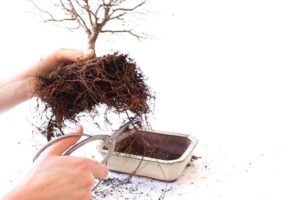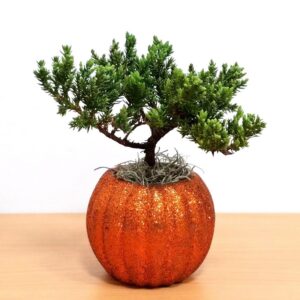UNDERSTANDING AND TREATING
THE
COMPULSIVE/PATHOLOGICAL BONSAI ENTHUSIAST
By James Keith
With the spring quickly approaching I have begun my annual regiment of preparing for repotting and trimming. As the weather begins to break and the days get longer the impatience for the beginning of a new bonsai season begins to take hold. My thoughts
turn to supplies and materials for the coming growing season. I begin to delve into my reading materials and prepare to attend Prairie State Bonsai Society meetings, my local club here in the Chicago area. I notice that as the days begin to get longer, more and more of my time and attention after dinner is diverted from time spent painting, reading and other activities to bonsai.
My wife has also noticed my preoccupation with the advent of the bonsai season. She is a mental health counselor and has a keen knowledge of the Diagnostic and Statistical Manual of Mental Disorders. One night recently she came home from work and
indicated that she had come up with a diagnosis for my noticeable lack of ability to focus and maintain concentration when she was speaking to me. She provided me with the following information which I am sure you, as a bonsai person, will understand and appreciate. I now know that there is hope for me and that there is a name for this affliction. Armed with this knowledge I felt a keen sense of responsibility to share it with you so that I can help to spread the word that there is hope, and that you too can take back control of your life and get the help that you need. See if you recognize yourself and enjoy!
Compulsive and Pathological will be used interchangeably throughout this article.
DEFINITION OF PATHOLOGICAL BONSAI ARTISTRY
A progressive disorder characterized by:
Continuous or periodic loss of control of doing Bonsai
A preoccupation with Bonsai and with obtaining money to purchase
Trees
A continuation of behavior despite adverse consequences such as
spouse spending money at outlet malls when the Bonsai enthusiast
is at shows or working on trees
Irrational thinking
DSM IV (Diagnostic and Statistical Manuel of Psychiatric Disorders)
criteria for diagnosing Compulsive/Pathological Bonsai Artistry:
- Persistent or recurrent mal-adaptive Bonsai behavior as indicated
in at least five (5) of the following:
- Preoccupation with Bonsai
- Needs to do Bonsai for increased periods of time to achieve
desired excitement
- Has repeated unsuccessful efforts to control, cut back or
stop doing Bonsai
- Is restless or irritable when attempting to cut down or stop
doing Bonsai
- Does Bonsai as a way of escaping problems or relieving a
dysphoric mood
- After doing Bonsai all day, often return to next day to
do more
- Lies to family members, friends, or others to conceal
the amount of time and money spent on the art of
Bonsai
- Has committed illegal acts such as digging up and
removing tress of interest from private and commercial
properties (usually after dark)
- Has jeopardized or lost a significant relationship, job, or
educational opportunity due to Bonsai
- Relies on others to provide money to relieve desperate
financial situations caused by Bonsai
- Bonsai behavior is not better accounted for or described as a Manic
Episode (a symptom of Bi-Polar Disorder)
TYPES OF BONSAI ENTHUSIASTS:
Casual Social Bonsai Enthusiast
Does Bonsai infrequently as entertainment
If there were no trees to Bonsai, it would not be missed
Rarely escalates to Compulsive. If it does it is usually in response
to trauma
Serious Social Bonsai Enthusiast
Does Bonsai as a major source of entertainment and does so regularly
Great absorption and intensity
Bonsai still just a pastime
Can stop, but would miss it
Rarely escalates to Compulsive. If it does it is usually in response to
trauma
Relief and Escape Bonsai Enthusiast
Major activity in life, equal to family and work
More than a pastime
Can stop, but with more difficulty than Serious Social Bonsai
Enthusiasts
Rarely escalates to Compulsive. If is does it is usually in
response to trauma
Professional Bonsai Artist
Bonsai is primary source of income
Makes a living selling/teaching Bonsai
Very controlled, patiently waits for the best trees
Anti-Social Bonsai Enthusiast
Life career is getting trees illegally
Cannot control his/her criminal personality
Compulsive Bonsai Enthusiast
Bonsai is the only thing in life
Ignores family and work and often turns to crime to support habit
Cannot stop (without treatment)
Life is ruined unless he/she gets help
The Action Seeker
Predominantly male Criminal activity, arrest record
Starts young Narcissistic
Competitive Money is principle relapse issue
Bonsai “friends” Become Escape Bonsai Enthusiasts
Grandiose
The Escape Bonsai Enthusiast
Predominantly female Relationship issues
Non-competitive Debts lower, no attempt to control
Short Bonsai career Emotion is primary relapse issue
Late onset
Social/Financial Impact
Job loss (taking off work to work on trees)
Health problems (heat stroke due to working on trees in 90-degree heat)
Arrests (stealing trees from private/commercial properties)
Household debt (buying trees and attending workshops instead of paying
the mortgage)
Where Can the Compulsive Bonsai Enthusiast Get Help?
BA (Bonsai Anonymous)
12-Step Program
Free to anyone seeking help
BonAnon
For family of Compulsive Bonsai Enthusiasts
Treatment
Insurance will cover treatment since most Compulsive Bonsai Enthusiasts are dually diagnosed with other disorders such as:
Major Depressive Disorder
PTSD (Post-Traumatic Stress Disorder)
Bi-Polar (formerly called Manic-Depressive Disorder)
Adjustment Disorder
Compulsive Sumi-e Disorder
Self-Exclusion
Supportive tool to assist individuals who decide to recognize Bonsai as a
problem:
Can sign-up at any participating Arboretum, Bontanical Garden,
or greenhouse that sells Bonsai supplies
Removes your name from mailing lists
Does not allow you to purchase trees or supplies without cash
Totally voluntary, however, a Bonsai Enthusiast’s family can
file a self-exclusion form if they can prove reason for financial
concern
(This is available in Illinois only. Will not pertain to purchases
made or workshops attended at Rendesvous at Brussels Bonsai
in Olive Branch, Mississippi.



